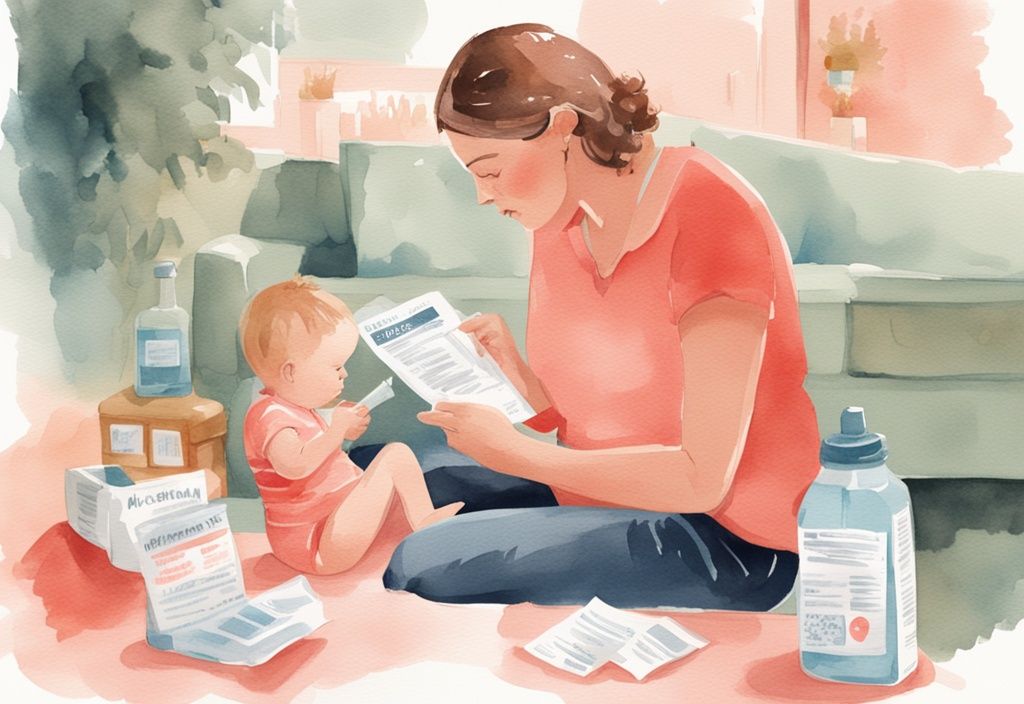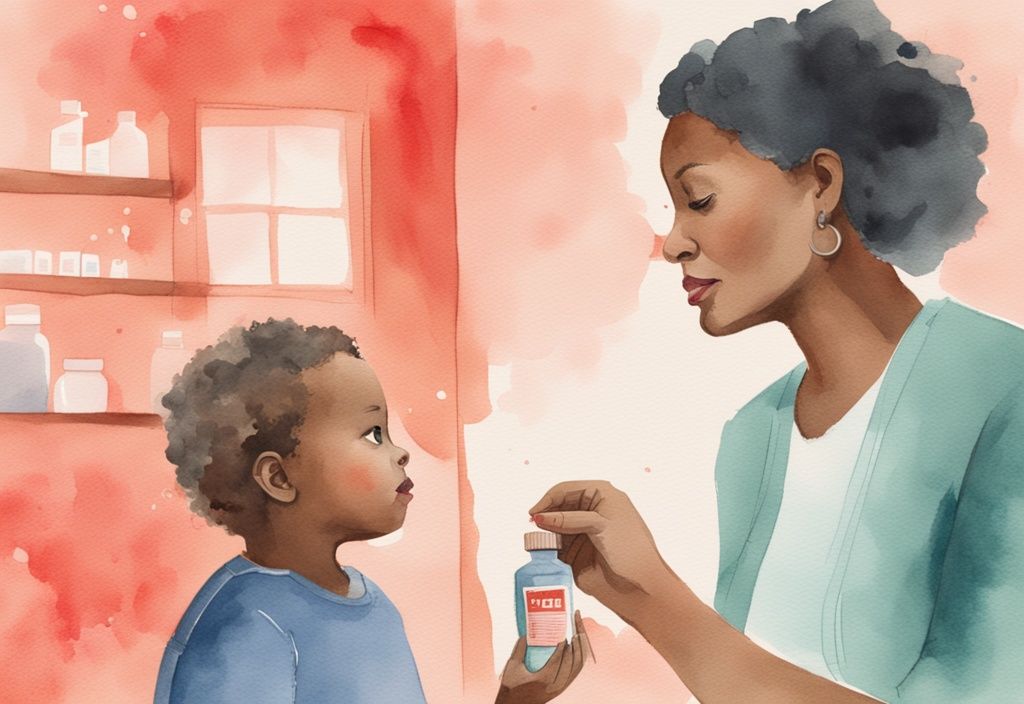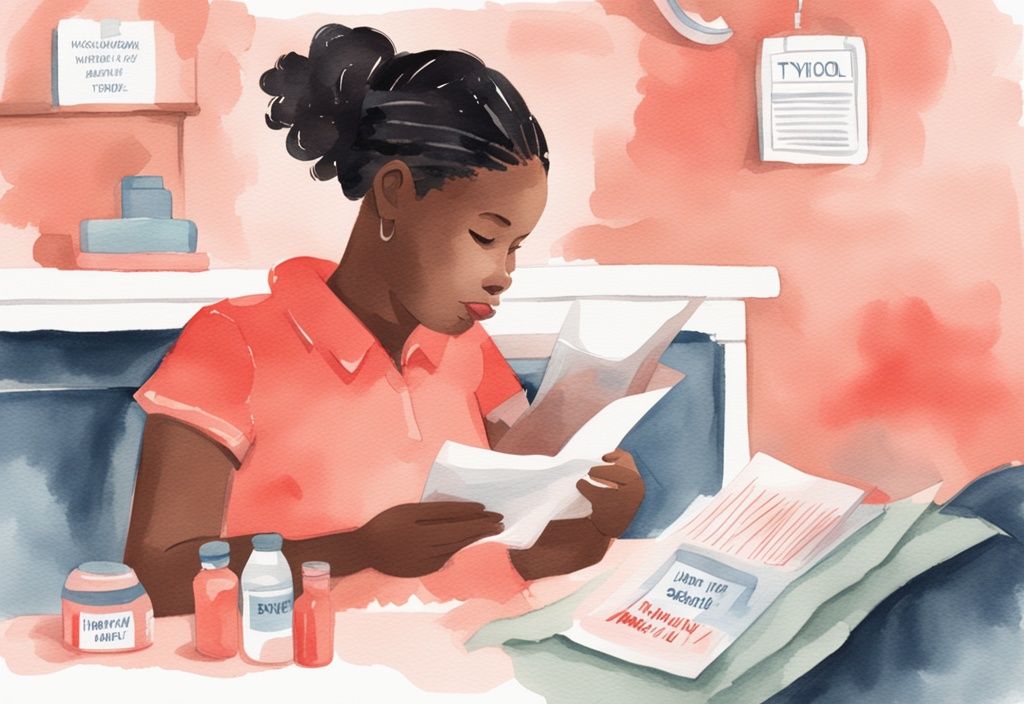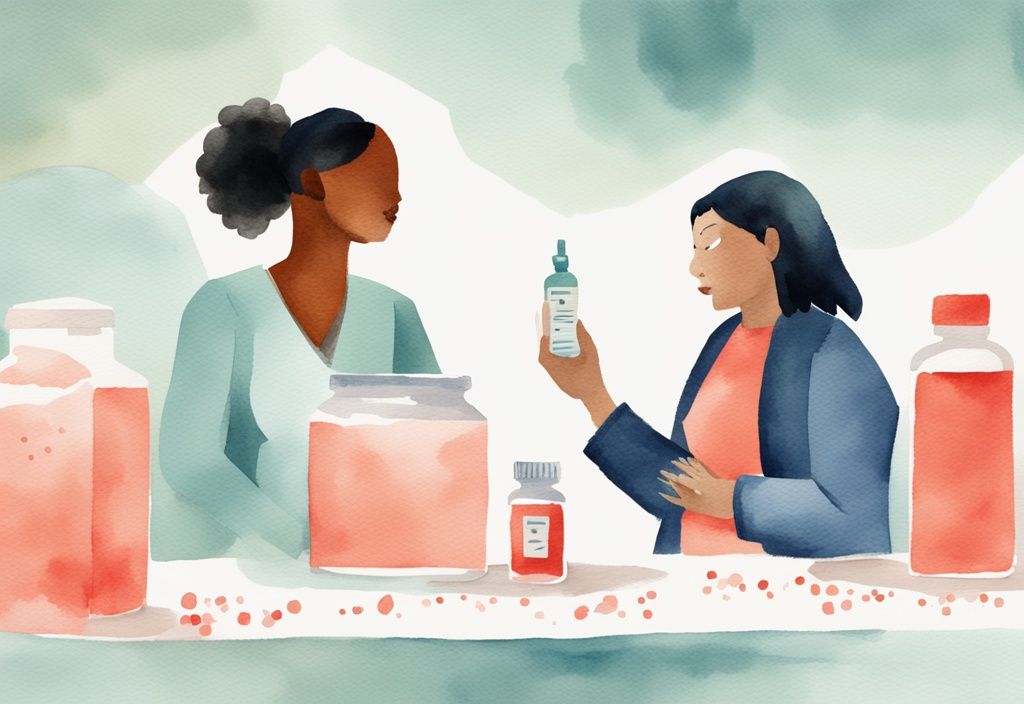Hello fellow parents, it’s Mia here. Can we chat a minute about that worry that sneaks up on us after our baby’s vaccines? You know, when a tiny fever spikes and we just want their discomfort to fade. Quick-fix: Tylenol, right? Surprisingly, that might not be best.
Recent research suggests that our well-intentioned move to reach for Tylenol may inadvertently dull the effectiveness of the vaccine. That mild fever we dread? It’s actually a sign our little one’s body is diligently working to fend off future nasties.
This article dives into why the benefits of refraining from Tylenol post-vaccination might outweigh the seconds of solace. Plus, I’ll share some kinder, non-medical comfort measures. Let’s explore this together, navigating our parenting path with love and informed choices.
Understanding the Immune Response Post-Vaccination
Vaccines are key tools in safeguarding your baby’s health, as they help develop the immune system from an early age, which can be further explored in detail at this resource. Often, the body’s reaction to a vaccine can prompt questions, especially when a mild fever arises. Let’s explore why this happens and why giving Tylenol might not be the best idea.
The Significance of Fever After Vaccination
Fever is a natural part of the body’s immune response to vaccines and is an indicator that the immune system is functioning well. When your baby develops a mild fever after vaccination, it usually means their body is actively making protective antibodies. About half of all babies experience a mild fever post-vaccination, which is normal and expected. This temperature rise signals that the body is building defenses against the pathogen the vaccine mimics.
Understanding this role of fever can reassure parents that their little one is developing the necessary immunity. It’s like when your baby learns to walk — every stumble is part of the process. Fever signifies that the immune system is doing its job.
How Vaccines Work: A Brief Insight
Vaccines work by mimicking harmful pathogens to prompt the immune system to mount a defense, without causing the actual disease. The main goal is to produce antibodies, the specialized proteins that identify and neutralize pathogens. Introducing a vaccine to the body triggers this immune response in a controlled manner, enabling the immune system to learn and remember how to fight off the real pathogen in future encounters.
A slight fever after vaccination is a positive sign indicating that the immune system is actively processing the vaccine. It’s reinforcing the creation of a robust and protective immune response, much like your baby’s first steps towards future health.
In conclusion, while the urge to manage a post-vaccination fever with Tylenol is strong, understanding the beneficial role of fever helps parents make better-informed decisions. Fever is a sign of a healthy immune response, showing that the body is efficiently building its defense mechanisms. Allowing natural immune processes to proceed without interference can maximize the effectiveness of the vaccination. So, sometimes it’s best to let nature take its course, giving your baby’s immune system the chance to do what it was designed for.
The Controversial Role of Tylenol Post-Vaccination
How Tylenol Impacts Immunity
It’s completely natural to worry about your little one’s discomfort, but did you know that giving Tylenol (acetaminophen) right after a vaccine might not be the best idea? Sure, it can lower your baby’s fever, yet fever is a crucial part of the immune response. While it’s tough to see your baby feeling unwell, that fever is their tiny body working hard to create protective antibodies. By giving Tylenol to bring down the fever, there’s a chance you might be dampening this important immune response.
This could mean fewer antibodies are produced, potentially reducing the effectiveness of the vaccine. It’s a key reason why not to give baby Tylenol after vaccines – it might interfere with their natural defense system.
Finding the Connection: Research on Tylenol and Vaccination
Let’s dive a bit into the research to understand more. A groundbreaking study published in the Lancet involved 459 infants from the Czech Republic, and the findings were eye-opening. The study discovered that babies who were given Tylenol had significantly lower antibody levels compared to those who weren’t. This suggests that the antipyretic (fever-reducing) effects of Tylenol might hinder a baby’s ability to build a strong immune response after a vaccine. Further studies have echoed similar concerns, indicating that Tylenol could reduce the immune response rate.
So, unless it’s absolutely necessary, it’s wise to avoid giving Tylenol to ensure your baby gets the most from their vaccines. Understanding these research findings is essential in knowing why not to give baby Tylenol after vaccines. It can unintentionally lower the immune response, potentially affecting how well they’re protected against illnesses in the long run.
Beware of the Routine Use of Tylenol After Vaccination
Reduced Vaccine Effectiveness: The Major Concern
One really important thing to understand about why not to give baby Tylenol after vaccines is that it might reduce how well the vaccine works. Studies have shown that using Tylenol ahead of time can result in lower antibody responses. Even though over 90 percent of kids still get protection after booster doses, the general antibody levels do take a hit.
The Centers for Disease Control and Prevention (CDC) advises against the routine use of antipyretics like Tylenol before vaccination. This advice helps us remember how crucial it is to let the immune system respond naturally.
Potential Risks: From Liver Problems to ADHD
Giving Tylenol repeatedly doesn’t just lower vaccine effectiveness—it brings other health risks into play, too. Overusing Tylenol can lead to liver problems and has even been linked to higher chances of conditions like asthma and ADHD. These long-term effects make it clear: only use Tylenol when you absolutely have to.
Understanding these risks helps in making better choices for your baby. Consider alternative comfort measures whenever you can. Keeping your little one safe means knowing what’s best for their overall health and well-being.
What Do Experts Say?
The expert view on why not to give baby Tylenol after vaccines isn’t set in stone; it’s an ongoing discussion among healthcare professionals. Some experts say to avoid Tylenol unless your baby is clearly uncomfortable or has a fever.

They recommend using natural comfort measures for post-vaccination symptoms whenever possible. It’s always best to consult your pediatrician before giving Tylenol. This ensures you’re making informed decisions that fit your baby’s specific health needs.
Looking for Tylenol Alternatives Post-Vaccination?
It’s essential to understand the importance of preserving your baby’s natural immune response after vaccines. Discover gentle, medication-free ways to keep your little one comfortable while supporting their immune system.
Comfort Measures that Don’t Involve Medications
One crucial reason why not to give baby Tylenol after vaccines is to preserve the natural immune response. Instead, consider alternative comfort measures that do not involve medication.
Warm baths can be incredibly soothing, helping to calm and relax your baby. These cozy moments in the water can offer significant relief from any post-vaccine discomfort.
Another gentle alternative is engaging in skin-to-skin time. If you’re wondering about outdoor activities, you might be curious about when you can put your baby in a swing at the park. This not only comforts your baby but also strengthens the parent-child bond, providing emotional reassurance. Those snuggles work wonders.
Continuous feeding, whether through breastfeeding or bottle-feeding, ensures your baby remains hydrated and can provide a comforting routine. It’s amazing how a familiar routine can help soothe and reassure your little one.
Physical reassurance is also key. Gentle rocking or holding can significantly alleviate minor discomforts. Sometimes, just being in your arms can make everything better.
Using distraction techniques can be effective too. Playing soft music, offering a favorite toy, or engaging your baby with gentle play can shift their focus from any discomfort, helping them cope without medication.
These methods provide supportive and nurturing alternatives, allowing your baby’s immune system to function optimally.
When It Is Okay to Use Medication
Medication should only be considered if your baby shows signs of notable discomfort, which might indicate a stronger reaction to vaccination. An important aspect of why not to give baby Tylenol after vaccines is the potential impact on the body’s natural immune response.

However, there are situations where medication becomes necessary. Always consult a healthcare provider for appropriate dosing and safety guidelines, tailoring the approach to your baby’s specific needs.
It is safer to monitor your baby and wait to assess the response before opting to administer medicine. If your little one appears unusually distressed or the discomfort seems substantial, a healthcare professional’s advice is invaluable.
Consulting a pediatrician ensures that any medication given is both necessary and safe, minimizing risks while addressing your baby’s immediate needs. Keeping things safe and effective is always the priority.
Striking a Balance: Risks and Benefits of Post-Vaccination Care
Deciding on the best post-vaccination approach for your little one is crucial. The following sections dive into the potential risks and benefits of medicating your baby after they receive their shots.
Making the Difficult Decision: To Medicate or Not
Deciding whether to medicate your baby post-vaccination is no small task. One primary aspect to consider is balancing the need for fever relief with the potential impact on vaccine efficacy. Why not give baby Tylenol after vaccines? Well, Tylenol—or acetaminophen—works to reduce fever, but fever can be a sign that your baby’s body is hard at work developing a strong immune response.
Fever means that the body is producing protective antibodies. By lowering it, you might accidentally reduce the effectiveness of the vaccine. So, it’s a hard choice: do you go for short-term comfort or aim for long-term robust immunity? Every parent must weigh these factors, trusting their instincts and maybe a bit of professional advice to make the best choice for their little one.
Key Points to Consider in Fever Management Post-Vaccination
Monitoring your baby for signs of high fever or discomfort is essential. Keep an eye on their temperature and overall well-being to decide the best course of action. Instead of going straight for Tylenol, consider trying physical comfort measures first.
Think about:
- Offering a warm bath
- Engaging in skin-to-skin contact
- Ensuring proper hydration
These methods can help alleviate minor discomfort and keep your baby’s immune response intact. However, if your little one’s symptoms persist or worsen, it’s important to consult a pediatrician. Every baby is unique, and healthcare providers can offer the best guidance tailored to your baby’s needs. For more tips on managing sleep issues, learn about how to break the cycle of an overtired baby.
Final Thoughts: Weighing the Pros and Cons of Tylenol Post-Vaccination
When considering why not to give baby Tylenol after vaccines, it’s essential to balance the short-term relief of fever and discomfort against potentially long-term impacts on vaccine efficacy. Research has shown that routine administration of Tylenol post-vaccination can lead to reduced antibody production, thereby potentially diminishing the vaccine’s effectiveness.
Both medical professionals and studies suggest that the immune response signaled by a fever is beneficial, as it indicates the body is actively creating a defense against the pathogenic mimic introduced by the vaccine. Lowering this fever with Tylenol might inadvertently suppress this vital immune reaction. Therefore, it’s crucial to think twice before reaching for Tylenol at the first sign of a post-vaccination fever and instead consider whether the fever is tolerable and potentially beneficial.
Comprehensive research, including a pivotal study published in the Lancet, supports the conclusion that using fever-reducing medications like Tylenol may indeed curb the immune response rate. This has led health organizations, such as the CDC, to advise against the routine use of antipyretics before or immediately after vaccinations for babies.
When making decisions about post-vaccination care, always consider personalized medical advice. Consulting with your pediatrician will offer tailored guidance that fits your baby’s specific health needs. While fever and discomfort are often manageable with non-medicated measures, understanding the broader implications of using Tylenol can help you make the most informed and beneficial choice for your baby’s health.
To strike the right balance, it’s important to assess whether the immediate relief of symptoms is worth the potential risk to vaccine-induced immunity—a perspective supported by both research and expert recommendations.
FAQs About Baby Care Post-Vaccination
Why Could it Be Risky to Give Tylenol After Vaccination?
Administering Tylenol post-vaccination can reduce the immune response, leading to lower antibody production. This reduction may decrease vaccine effectiveness, making it less likely that your baby will build the optimal level of immunity. In simple terms, lower antibody levels can compromise the protective effects of the vaccine.
How Crucial is Fever in the Vaccine Response?
Ah, fever – it’s like that unexpected guest who brings a mixed bag of feelings. Fever plays a critical role in the post-vaccination immune response. It signifies that the body is actively working to produce antibodies, a key component in establishing protection against the virus or bacteria targeted by the vaccine. Think of fever as your baby’s immune system shouting, “I’m on it!” letting you know it’s doing its thing.
What Non-Medicated Comfort Measures Can be Used Instead of Tylenol?
Several non-medicated approaches can help alleviate discomfort after vaccination. Here are a few soothing tips:
- Warm baths: These can provide relaxation and comfort to your little one.
- Skin-to-skin time: Hold your baby close, providing reassurance and comfort.
- Hydration: Keep your baby well-hydrated and offer plenty of cuddles.
- Feeding: Regular feeding can also provide comfort.
These methods can be great alternatives to administering medication.
What are Some Common Misconceptions About Post-Vaccination Care for Babies?
Let’s bust some myths together:
- Medication is always necessary: A widespread misconception is that medication should always be used to prevent any post-vaccination fever.
- Fever is harmful: Another false belief is that all fevers following vaccination are harmful and require medical intervention.
Understanding that mild fever is a normal part of the immune response is crucial. It’s essentially your baby’s body gearing up to fight the good fight.
Is There a Safer Way to Manage Vaccine Discomfort?
Yes, non-medicated approaches should be the first step in managing any post-vaccination discomfort. Consider administering Tylenol only if the baby exhibits significant discomfort and after consulting with a pediatrician. Monitoring the baby and using non-pharmacological methods is generally safer and creates less fuss.
What to Do When High Fever Persists After Vaccination?
If a high fever continues beyond 72 hours or severe symptoms develop, it’s time to contact a healthcare provider. Follow your pediatrician’s advice to manage any prolonged or intense reactions. Prompt medical guidance ensures appropriate care and intervention, making sure your little one gets the best care they need.


